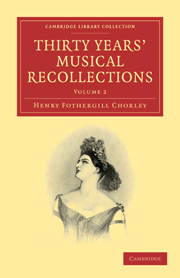Book contents
- Frontmatter
- Contents
- THE YEAR 1847
- THE YEAR 1848 (Her Majesty's Theatre.)
- THE YEAR 1848 (Royal Italian Opera.)
- THE YEAR 1849 (Her Majesty's Theatre.)
- THE YEAR 1849 (Royal Italian Opera.)
- THE YEAR 1850 (Her Majesty's Theatre.)
- THE YEAR 1850 (Royal Italian Opera.)
- THE YEAR 1851 (Her Majesty's Theatre.)
- THE YEAR 1851 (Royal Italian Opera.)
- THE YEAR 1852 (Her Majesty's Theatre.)
- THE YEAR 1852 (Royal Italian Opera.)
- THE YEAR 1853 (Royal Italian Opera.)
- THE YEAR 1854 (Royal Italian Opera)
- THE YEAR 1855 (Royal Italian Opera.)
- THE YEAR 1856 (Her Majesty's Theatre.)
- THE YEAR 1856 (Royal Italian Opera.)
- THE YEAR 1857 (Royal Italian Opera.)
- THE YEAR 1857 (Her Majesty's Theatre.)
- THE YEAR 1858 (Her Majesty's Theatre.—Royal Italian Opera.—Drury Lane.)
- THE YEAR 1859 (Royal Italian Opera.—Drury Lane.)
- The Last Chapter
THE YEAR 1849 (Her Majesty's Theatre.)
Published online by Cambridge University Press: 29 August 2010
- Frontmatter
- Contents
- THE YEAR 1847
- THE YEAR 1848 (Her Majesty's Theatre.)
- THE YEAR 1848 (Royal Italian Opera.)
- THE YEAR 1849 (Her Majesty's Theatre.)
- THE YEAR 1849 (Royal Italian Opera.)
- THE YEAR 1850 (Her Majesty's Theatre.)
- THE YEAR 1850 (Royal Italian Opera.)
- THE YEAR 1851 (Her Majesty's Theatre.)
- THE YEAR 1851 (Royal Italian Opera.)
- THE YEAR 1852 (Her Majesty's Theatre.)
- THE YEAR 1852 (Royal Italian Opera.)
- THE YEAR 1853 (Royal Italian Opera.)
- THE YEAR 1854 (Royal Italian Opera)
- THE YEAR 1855 (Royal Italian Opera.)
- THE YEAR 1856 (Her Majesty's Theatre.)
- THE YEAR 1856 (Royal Italian Opera.)
- THE YEAR 1857 (Royal Italian Opera.)
- THE YEAR 1857 (Her Majesty's Theatre.)
- THE YEAR 1858 (Her Majesty's Theatre.—Royal Italian Opera.—Drury Lane.)
- THE YEAR 1859 (Royal Italian Opera.—Drury Lane.)
- The Last Chapter
Summary
Signor Rossini's music, which had been all but banished from Her Majesty's Theatre for a couple of seasons (Mademoiselle Lind not being, apparently, at ease in his operas), returned there this year, in consequence of changes in the company, which rendered performances of the newer refectory not attractive. Signor Verdi's star (as may be seen) had waned—not to brighten in England until his real popularity arrived in “Il Trovatore,” and (more's the discredit!) “La Traviata.”—There was no attempt to promise or to produce any new work. The thing to be done, clearly, was to “keep the theatre going,” in some manner or other.—It was no longer a case of art, but of artists.
The return of Madame Sontag to the stage—as one of the most remarkable events in the biography of singers—claims a separate notice.—Another curious appearance was made in the person of Mademoiselle Parodi.—Of this young lady persons conversant with the theatres across the Alps had been hearing for some years.—It had been told them that she was the tragic singer on whom Madame Pasta had let fall her mantle—that she had been watched, cherished, counselled, approved, by that admirable artist.—The supremacy of the departed Queen of musical tragedy has, by the way, been in nothing more remarkably displayed, than by the manner in which her approval has been fictitiously worked to recommend inferior singers about to cross the Alps, before they have arrived.
- Type
- Chapter
- Information
- Thirty Years' Musical Recollections , pp. 61 - 84Publisher: Cambridge University PressPrint publication year: 2009First published in: 1862

